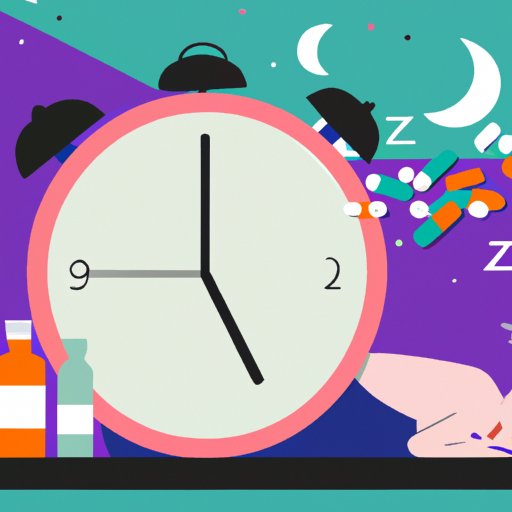Introduction
Sleeping pills, also known as sleep aids or hypnotics, are drugs used to help people fall asleep and stay asleep. They are designed to treat various sleep disorders, such as insomnia, and can be taken on a short-term or long-term basis. While there are many over-the-counter (OTC) sleep aids available, prescription sleeping pills are typically more powerful and can be more effective in treating sleep problems.
Sleep problems, such as difficulty falling and staying asleep, are fairly common. According to the National Sleep Foundation, about 50 to 70 million Americans suffer from a sleep disorder. Insomnia is the most common sleeping disorder, impacting 10 to 15 percent of adults. Other sleeping disorders, such as sleep apnea, narcolepsy, and restless leg syndrome, can also cause difficulty sleeping and should be treated with the help of a doctor.

A Comprehensive Guide to the Best Sleeping Pills on the Market Today
When it comes to finding the best sleeping pill, it’s important to consider the pros and cons of each medication. Many people prefer to use OTC sleep aids, such as melatonin, because they are generally considered safe and have few side effects. However, these medications may not be strong enough to effectively treat more severe sleep problems. Prescription sleeping pills, on the other hand, can be more powerful and can be more effective in helping people get better sleep. Some of the most commonly prescribed sleep aids include benzodiazepines, non-benzodiazepines, and antihistamines.

Benefits and Risks of the Most Commonly Prescribed Sleep Aid Drugs
The most common side effects of taking sleeping pills include drowsiness, dizziness, memory loss, dry mouth, and headaches. It’s important to note that some people may experience more serious side effects, such as confusion, disorientation, and difficulty breathing. Additionally, sleeping pills can be habit forming and should not be taken for more than two weeks without consulting a doctor. Long-term use of sleeping pills can also lead to an increased risk of falls and fractures.
It’s important to understand the potential risks associated with taking sleep medications before starting a regimen. People with certain medical conditions, such as glaucoma, kidney disease, and liver disease, should talk to their doctor before taking any type of sleeping pill. Additionally, pregnant women and nursing mothers should speak to their doctor before taking any type of sleep medication.
Understanding the Different Types of Sleeping Pills: What to Consider Before Taking
There are several types of sleeping pills available, and it’s important to understand the differences between them before taking any medication. Benzodiazepines, such as Xanax and Valium, are some of the most commonly prescribed sleeping pills. These medications work by calming the central nervous system, which helps people relax and fall asleep. Non-benzodiazepines, such as Ambien and Lunesta, are also commonly prescribed and work by targeting the same brain receptors as benzodiazepines. Antihistamines, such as Benadryl, are another type of sleep medication and work by blocking the histamine receptor, which can help people fall asleep.
When choosing a sleeping pill, it’s important to consider the potential side effects, as well as the effectiveness of the medication. It’s also important to talk to your doctor to make sure the medication is safe for you to take. Additionally, it’s important to understand the potential risks associated with taking sleep medications, such as addiction and dependence.
A Head-to-Head Comparison of the Top Selling Sleeping Pills
When it comes to choosing the best sleeping pill, it’s important to compare the effectiveness and cost of the top selling medications. For example, Ambien is one of the most popular sleep medications and is generally considered to be effective in helping people fall asleep. However, it can be expensive and has the potential to be habit forming. On the other hand, melatonin is a natural sleep aid and is generally considered to be safe, but it may not be strong enough to effectively treat more severe sleep problems.
It’s also important to consider the cost of the medication when choosing a sleeping pill. While some medications may be more expensive, they may be more effective in helping people get better sleep. Additionally, some medications may be covered by insurance, which can help reduce the overall cost.
Conclusion
Choosing the best sleeping pill for individual needs can be a difficult task. It’s important to understand the different types of sleeping pills available and to consider the potential risks and benefits associated with taking sleep medications. Additionally, it’s important to compare the effectiveness and cost of the top selling sleeping pills to determine which one is right for you. Ultimately, the best sleeping pill is the one that works best for you and helps you get a good night’s rest.
By following this comprehensive guide, you can find the best sleeping pill for your individual needs. Remember to consult your doctor before taking any type of sleep medication, and always follow the instructions provided by the manufacturer.
(Note: Is this article not meeting your expectations? Do you have knowledge or insights to share? Unlock new opportunities and expand your reach by joining our authors team. Click Registration to join us and share your expertise with our readers.)
